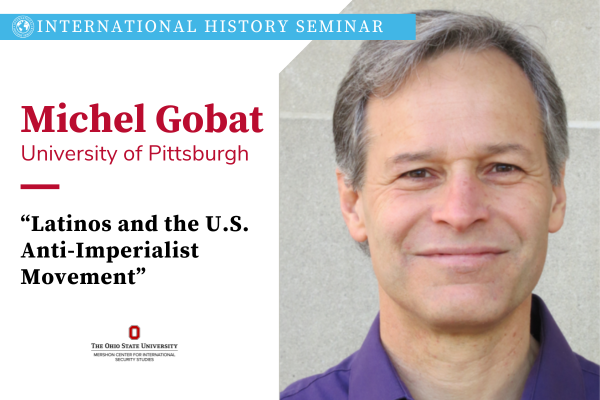
Registration
Reception will run from 3:30pm to 4:00pm, the talk will begin at 4:00pm
Michel Gobat joins the Mershon Center to discuss his recent paper exploring the role that Latinos played in one of the oldest US political traditions: anti-imperialism. In both the nineteenth and twentieth centuries, the anti-imperialist movement was most often concerned with US intervention in Latin America— arguably the world region most deeply marked by US hegemonic aspirations. Yet Latino participation in the US anti-imperialist movement remains little studied. This is all the more surprising given that the movement’s greatest effects on Washington’s Latin America policy coincided with booms in Latin American migration to the United States. This was especially true of the 1920s, when the anti-imperialist movement supported local resistance to the US military occupations of the Dominican Republic, Haiti, and Nicaragua; and the 1980s, when it resisted President Reagan’s proxy wars in Central America. Focusing on these two moments, the paper seeks to provide a fresh perspective on a longstanding US political tradition by showing how Latinos strengthened the movement’s effectiveness. They made it not only less racist and less xenophobic but also more transnational and better informed of the local effects of US intervention.
Speaker

Michel Gobat is Chair of the History Department at University of Pittsburgh. His research and teaching interests focus on modern Latin America, U.S.-Latin American relations, and international history. His publications include Confronting the American Dream: Nicaragua under U.S. Imperial Rule (Duke University Press, 2005), which explores how Nicaragua was transformed by the U.S. occupation of 1912-1933; and “The Invention of Latin America: A Transnational History of Anti-Imperialism, Democracy, and Race,” American Historical Review (Dec. 2013), which addresses the question of how continents are imagined by exploring the origins and significance of the idea of Latin America. Gobat is a recipient of fellowships from the National Endowment for the Humanities, the American Council of Learned Societies, and the Swiss National Fund for Scientific Research. He is currently completing a book on Central America’s encounter with U.S. overseas settler colonialism during the mid-nineteenth-century era of global imperial expansion.
About the International History Seminar
If you are interested in attending this semester’s events and joining the International History Seminar, please send an email confirming your interest to the Hayes Chair Graduate Research Associate, Cam Givens, at hayeschairgra@osu.edu, and you will be included on the mailing list going forward. Select materials can only be pre-circulated to those who have signed up.
